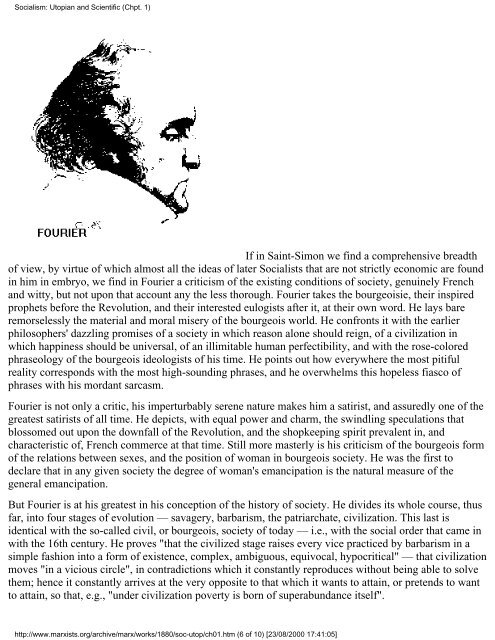Socialism: Utopian and Scientific - MIA
Socialism: Utopian and Scientific - MIA
Socialism: Utopian and Scientific - MIA
Create successful ePaper yourself
Turn your PDF publications into a flip-book with our unique Google optimized e-Paper software.
<strong>Socialism</strong>: <strong>Utopian</strong> <strong>and</strong> <strong>Scientific</strong> (Chpt. 1)If in Saint-Simon we find a comprehensive breadthof view, by virtue of which almost all the ideas of later Socialists that are not strictly economic are foundin him in embryo, we find in Fourier a criticism of the existing conditions of society, genuinely French<strong>and</strong> witty, but not upon that account any the less thorough. Fourier takes the bourgeoisie, their inspiredprophets before the Revolution, <strong>and</strong> their interested eulogists after it, at their own word. He lays bareremorselessly the material <strong>and</strong> moral misery of the bourgeois world. He confronts it with the earlierphilosophers' dazzling promises of a society in which reason alone should reign, of a civilization inwhich happiness should be universal, of an illimitable human perfectibility, <strong>and</strong> with the rose-coloredphraseology of the bourgeois ideologists of his time. He points out how everywhere the most pitifulreality corresponds with the most high-sounding phrases, <strong>and</strong> he overwhelms this hopeless fiasco ofphrases with his mordant sarcasm.Fourier is not only a critic, his imperturbably serene nature makes him a satirist, <strong>and</strong> assuredly one of thegreatest satirists of all time. He depicts, with equal power <strong>and</strong> charm, the swindling speculations thatblossomed out upon the downfall of the Revolution, <strong>and</strong> the shopkeeping spirit prevalent in, <strong>and</strong>characteristic of, French commerce at that time. Still more masterly is his criticism of the bourgeois formof the relations between sexes, <strong>and</strong> the position of woman in bourgeois society. He was the first todeclare that in any given society the degree of woman's emancipation is the natural measure of thegeneral emancipation.But Fourier is at his greatest in his conception of the history of society. He divides its whole course, thusfar, into four stages of evolution — savagery, barbarism, the patriarchate, civilization. This last isidentical with the so-called civil, or bourgeois, society of today — i.e., with the social order that came inwith the 16th century. He proves "that the civilized stage raises every vice practiced by barbarism in asimple fashion into a form of existence, complex, ambiguous, equivocal, hypocritical" — that civilizationmoves "in a vicious circle", in contradictions which it constantly reproduces without being able to solvethem; hence it constantly arrives at the very opposite to that which it wants to attain, or pretends to wantto attain, so that, e.g., "under civilization poverty is born of superabundance itself".http://www.marxists.org/archive/marx/works/1880/soc-utop/ch01.htm (6 of 10) [23/08/2000 17:41:05]














![tyf Enf=O=n]lgg](https://img.yumpu.com/47584932/1/190x245/tyf-enfonlgg.jpg?quality=85)

